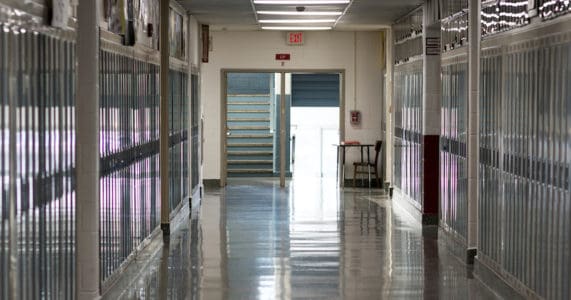By Peter Duncanson
School administrators are facing perhaps their most difficult fall season ever. Getting back to school has never been more uncertain or complicated. Ensuring the safety of students and faculty during the COVID-19 pandemic has raised some challenging questions, many of them about cleanliness and disinfection.

Infection control in schools is always a concern because of influenza and bacteria such as MRSA and C. diff, but COVID-19 presents new questions. Principals and school boards are seeking information and they often turn to cleaning professionals for the answers.
“We have received dozens of calls from school officials, most of them new to us, with questions about various aspects of cleaning and disinfecting for coronavirus,” said Steve Morgan, ServiceMaster Restoration Services in Marietta, GA. His company has worked with multiple school districts for more than a decade. “Some of them need our help because their janitorial staffs are overwhelmed, some just need advice, and we’re happy to provide it.”
The pandemic has created new business opportunities for those in the professional cleaning business. Not surprisingly, new companies and services have popped up, many guaranteeing to kill COVID-19. The question for school leaders is, who can you trust?
“In the weeks before we reopened school, I received calls and correspondence from cleaning companies all the time, about four or five a week,” said Michelle Fischer, principal of Immanuel Luther School in Memphis. “We were fortunate that we already worked with a cleaning company that we trusted, so we listened to their advice.”
You can usually identify legitimate, experienced cleaning companies because they carefully follow guidelines from the Centers for Disease Control and Prevention (CDC) and the Environmental Protection Agency (EPA). They also rely on peer-reviewed, published research. For infection prevention, there is no substitute for science.
Meanwhile, school officials must weigh the claims made by competing vendors, some trustworthy, some not as much. It’s a predicament for those making hard decisions about infection control. To help, here are answers to some frequently asked questions we get from schools about cleaning and disinfecting.
Do foggers work against Coronavirus?
There are different devices that are used to apply antibacterial and antiviral products over larger areas. The list includes foggers, electrostatic sprayers, electric sprayers, and pump sprayers. They sometimes all are incorrectly referred to as “foggers.”
An actual fogger vaporizes an antimicrobial/antiviral product to form Ultra Low Volume (ULV) droplets that destroy airborne and surface-borne pathogens. The direction of the spray and gravity are crucial to its effectiveness. It works well in large areas with few vertical surfaces, like a hallway.

Pump sprayers produce large droplets that don’t travel far and are inconsistent in size. Electric sprayers produce a more uniform spray pattern and are generally more effective than pump sprayers. Pump and electric sprayers work best for disinfecting small spaces like a desk or table. It’s important not to over wet the surface when using a sprayer.
Electrostatic sprayers utilize an electrode to initiate an attractive charge that atomizes the solution, releasing charged droplets that are actively attracted to surfaces. The mist reaches and wraps around surfaces regardless of the direction of the spray. Electrostatic sprayers are considered the fastest, most effective method for disinfecting large spaces with many different surfaces.
Note that all of these devices can be effective for disinfecting if they are applying the right product in the proper setting with the correct technique. Read product and device labels carefully and check the EPA List N registration site for product specifications. If you still have questions, ask a qualified professional.
Is ultraviolet light an effective disinfectant?
The short answer is Yes, but it’s not that simple. Ultraviolet C (UVC) light has been used for decades to disinfect surfaces. It’s actually used in some sewage treatment facilities to destroy pathogenic organisms. UVC light is produced by the sun but filtered out by the ozone layer, which is good because it can cause cancer in humans and damage our corneas.

Though effective as a germicide, there is a catch when using it for disinfecting rooms and surfaces. The intensity of the light and exposure time are critical to its effectiveness. Simply shining a UVC light on a surface won’t thoroughly disinfect it unless it is close enough and strong enough to kill the pathogen.
UVC light can be very useful for smaller surfaces such as keyboards, cell phones, tools and so forth. It is not very effective for deactivating Coronavirus in a classroom. Note that good old sunshine is also an effective disinfectant if items are exposed for enough time. The precise amount of time depends on the light’s intensity, but probably a couple of hours of summer sun will do the trick.
Do residual antimicrobial products work?
When evaluating residual antimicrobial products, look for those that provide protection from bacteria, mold and fungi for up to 90 days. You can find this information on the product label, along with an EPA registration number. The EPA verifies the claims of pesticides, which include products that kill pathogens, molds and fungi.
Evidenced-based studies conducted by independent laboratories, including peer-reviewed studies in the American Journal of Infection Control, support the protection claims of residual antimicrobial products.¹ Once application and drying are complete, residual antimicrobials add a layer of protection to help prevent contaminants adhering to the surface.
Residual antimicrobials help to create a cleaner, safer and healthier environment by offering long-lasting protection from organisms associated with serious illnesses like MRSA, staph and meningitis. Although these products do not protect against viruses or eliminate the need for daily cleaning and disinfecting, they do enhance protection against other organisms in addition to the regular cleaning and disinfecting you are doing.
How often should we clean our facility?
The answer: there is no such thing as too much cleaning, especially during a pandemic. The better question is, how much cleaning is practical in a normal school environment?
To help break the chain of infection, you should clean high touch points frequently, 3-4 times a day, if possible. This would include doorknobs, handrails, bathroom fixtures, shared keyboards, and countertops. Unless they are grossly soiled, wiping with a disinfecting agent is usually sufficient, but make sure you allow for adequate dwell time — the amount of time necessary for the product to kill bacteria and deactivate viruses.
School principal Fischer developed a thorough regimen for her teachers and staff based on advice from cleaning professionals.
“Before school restarted in August, we scrubbed down all the surfaces in the school with soap and water. Then, our cleaning service sprayed everything with an antimicrobial product that works for up to 90 days. This was not to kill coronavirus, but to kill other common germs like MRSA, staph and several others. On a daily basis we spray and wipe down all the high touch surfaces every morning. Our teachers sanitize again at lunch and the end of the day. We also disinfect the bathrooms and multipurpose rooms three times a day,” said Fischer.
She added that children wear face masks and are reminded to social distance and practice good personal hygiene. So far, her school, which includes PK3 through eighth grade, has experienced no new cases of COVID-19.
A final word
Remember that infection control begins with thorough cleaning soil loads followed by disinfecting with products certified by the EPA. Follow label directions and CDC guidelines carefully. Facility management teams with questions about cleaning and infection control are advised to seek advice from a professional cleaning service.
All educators know that homework is important. This is especially true when seeking the right protocols for keeping students and faculty free of infection. Safe schools are no accident.
Duncanson, CMRS, MWR, MSR, MTC, is director of commercial operations for ServiceMaster Restore. In this role he works with ServiceMaster franchisees nationwide to provide disaster restoration and infection prevention for commercial clients. He is past chairman of the Institute of Inspection, Cleaning and Restoration Certification and holds several industry designations. He also serves as a consultant to insurance companies as an expert witness and on cleaning and restoration projects.
1 “Long-acting water-stable organosilane agent and its sustained effect
on reducing microbial load in an intensive care unit,” American Journal of Infection Control, 2017
Want to read more about schools and facility management? Click here for more news items.


















![[VIDEO] Collect Asset Data at the Speed of Walking a Building](https://facilityexecutive.com/wp-content/uploads/2024/02/maxresdefault-324x160.jpg)
There are companies who claim that their antimicrobial product can protect against coronavirus. There are also products like Tio2 that claims it can protect the coated layer up to 12 months.
How do we verify this claims?